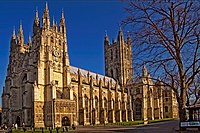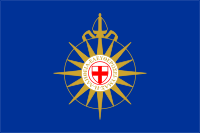
Back Anglikaanse Gemeenskap Afrikaans الاتحاد الأنجليكي Arabic Comunión anglicana AST Англиканско съобщество Bulgarian Iliz anglikan Breton Comunió anglicana Catalan Anglikánský svaz církví Czech Y Cymundeb Anglicanaidd Welsh Den anglikanske kirke Danish Anglikanische Gemeinschaft German
Anglican Communion | |
|---|---|
 | |
| Type | Communion |
| Classification | Protestant[note 1] |
| Orientation | Anglican |
| Scripture | Bible |
| Theology | Anglican doctrine |
| Polity | Episcopal |
| Primate of All England | Archbishop of Canterbury |
| Secretary | Josiah Idowu-Fearon |
| Region | Worldwide |
| Headquarters | London, England |
| Founder | Charles Longley |
| Origin | 1867 Lambeth Conference, London, England |
| Separated from | Roman Catholic Church |
| Separations | Continuing Anglican movement (1977) |
| Members | 85,000,000[1] |
| Official website | anglicancommunion.org |
| Logo |  |
| Anglican Communion |
|---|
 |
| Part of a series on Anglicanism |
| Organisation |
| Theology |
| Liturgy and worship |
| Other topics |
|
|
The Anglican Communion is the third largest Christian communion after the Roman Catholic and Eastern Orthodox churches.[2][3][4] Founded in 1867 in London, the communion has more than 85 million members[5][6][7] within the Church of England and other autocephalous national and regional churches in full communion.[8] The traditional origins of Anglican doctrine are summarised in the Thirty-nine Articles (1571). The archbishop of Canterbury (as of 2024[update], Justin Welby) in England acts as a focus of unity, recognised as primus inter pares ("first among equals"), but does not exercise authority in Anglican provinces outside of the Church of England. Most, but not all, member churches of the communion are the historic national or regional Anglican churches.[citation needed]
The Anglican Communion was officially and formally organised and recognised as such at the Lambeth Conference in 1867 in London under the leadership of Charles Longley, Archbishop of Canterbury. The churches of the Anglican Communion consider themselves to be part of the one, holy, catholic and apostolic church, and to be both catholic and Reformed. As in the Church of England itself, the Anglican Communion includes the broad spectrum of beliefs and liturgical practises found in the Evangelical, Central and Anglo-Catholic traditions of Anglicanism. Each national or regional church is fully independent, retaining its own legislative process and episcopal polity under the leadership of local primates. For some adherents, Anglicanism represents a non-papal Catholicism, for others a form of Protestantism though without a guiding figure such as Martin Luther, John Knox, John Calvin, Huldrych Zwingli, John Wesley or Jan Hus, [9] or, for yet others, a combination of the two.
Most of its members live in the Anglosphere of former British territories. Full participation in the sacramental life of each church is available to all communicant members. Because of their historical link to England (ecclesia anglicana means "English church"), some of the member churches are known as "Anglican", such as the Anglican Church of Canada. Others, for example the Church of Ireland and the Scottish and American Episcopal churches, have official names that do not include "Anglican". Conversely, some churches that do use the name "Anglican" are not part of the communion. These have generally disaffiliated over disagreement with the direction of the communion.
On 20 February 2023, ten communion provinces and Anglican realignment churches within the Global South Fellowship of Anglican Churches released a statement stating that they had declared "impaired communion" with the Church of England and no longer recognised Justin Welby as "first among equals" among the bishops of the communion, de facto marking a schism within the Anglican Communion.[10][11]
Cite error: There are <ref group=note> tags on this page, but the references will not show without a {{reflist|group=note}} template (see the help page).
- ^ "Anglicanismo". Igreja Anglicana (in Brazilian Portuguese). Archived from the original on 2 January 2020. Retrieved 2 January 2020.
- ^ Goodhew, David (2016). Growth and Decline in the Anglican Communion: 1980 to the Present. Taylor & Francis. pp. 45, 46, 47, 48, 49, 50. ISBN 978-1-317-12442-9.
- ^ Chapman, Mark David; Clarke, Sathianathan; Percy, Martyn (2016). The Oxford Handbook of Anglican Studies. Oxford University Press. pp. 1, 341. ISBN 978-0-19-921856-1.
- ^ Harvard Divinity School, Religious Literacy Project. "Anglican Communion Suspends Episcopal Church Over Same-Sex Marriage". RLP.HDS.harvard.edu. Archived from the original on 4 August 2020. Retrieved 6 May 2020.
- ^ "The Anglican Communion official website – "Provincial Registry"". Archived from the original on 7 March 2015. Retrieved 9 January 2017.
- ^ Kurian, George Thomas; Lamport, Mark A. (2015). Encyclopedia of Christian Education. Rowman & Littlefield. p. 50. ISBN 978-0-8108-8493-9.
With a membership currently estimated at over 85 million members worldwide, the Anglican Communion is the third largest Christian communion in the world, after the Roman Catholic Church and the Eastern Orthodox churches.
- ^ Muñoz, Daniel (May 2016). "North to South: A Reappraisal of Anglican Communion Membership Figures". Journal of Anglican Studies. 14: 71–95. doi:10.1017/S1740355315000212. S2CID 147105475.
- ^ "St Francis of Assisi Episcopal Church History". 20 July 2012. Archived from the original on 15 August 2012. Retrieved 11 August 2011.
- ^ Avis 1998, pp. 417–419.
- ^ Staff (21 February 2023). "Anglican group rejects Archbishop of Canterbury as schism widens". France 24. Retrieved 22 February 2023.
- ^ Lawless, Jill (20 February 2023). "Anglican bishops reject leader Welby over gay marriage". ABC News. Associated Press. Retrieved 22 February 2023.
© MMXXIII Rich X Search. We shall prevail. All rights reserved. Rich X Search